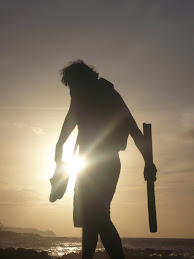 |
| Walking the streets of Tudvetey. |
We step through double-doors - as in the first door opens outwards, you cross a footlong threshold, then push the second door inwards - and climb a narrow stairway to the Governor's office. The double-doors are prevalent throughout the building, as are double-windows - a low-tech version of double-glazing - to keep precious heat in during the freezing winter months.
 |
| The Governor of Tudvetey |
Kat is happy to find that women seem to have an equal ranking in Mongolian society, there are photos and portraits of men and women in all sorts of leadership positions.
The Governor's office is sparsely elegant and looks over the town square. He is a large man, resembling a retired wrestler to me. My suspicions are confirmed [perhaps?] when we spy some framed photos of Mongolian Wrestlers in his display cabinet amongst offical-looking gifts and certificates.
Speaking through Bek, Rick introduces us as Designers of Sustainable Systems, and respectfully explains why we are here and what we hope to achieve by teaching the Permaculture Design Course. I'll do my best to paraphrase:
"As you know, the land here has reached its capacity to hold livestock and weather patterns have been changing, giving you more frequent tzuds. We want to respect your traditions and help you preserve Mongolian culture, and help teach your people how to grow vegetables to be more resilient during the hard times..."
Rick sounds like an International Diplomat, and I suppose that in this context he is ...we get the distinct feeling over the next few days that many of the foreigners who have been this deep into Mongolia have been, well, different...
In a culture so steeped in such a rich tradition, and at the same time increasingly obsessed with the razzle-dazzle of the 'Developed World', three Permaculturists must be quite an anomoly:
"Yes, we in the West do have lots of bright and shiny things, but we are learning that all that glitters is not gold. The food we eat is controlled by big corporations more interested in their profits than in our health, and our taste for bigger, faster, sweeter, fancier, easier ...has caused us to swell up like a fat, rich, and spoiled child.
The early bird may get the worm, but the second mouse always gets the cheese. You can learn more from our mistakes than our advances, and use these lessons to grow stronger instead of losing your way like we have.
Our way of life is not currently sustainable; Permaculturists have gone back to study traditional cultures to learn again, how to design systems that take better care of the land we live on, so that we can take better care of our peoples. This is the information and knowledge that we are here to share."
It is a lot different than the typical western approach - hands on hips, this is how we do things, aren't you lucky I am here to help... well intentioned, perhaps, but how effective is that approach to Overseas Development?
More to the point, how responsible is the typical western approach to Overseas Development?
The Governor has known of arrival for months beforehand, pledges his support, tells us of some of the initiatives his government has begun [39 hectares designated 'protected' for growing hay fodder] and asks us for help in designing a better septic system than the existing pit latrines [dug just above the water table, not good].
One of his senior ministers and a staff agronomist sits in on the meeting and take notes. We invite her out to the Oyogni Shim Co-Operative site visit and training today, and we all squeeze into the 4WD to get there.
 |
| Swampland so flat and dense with grasses that if you don't watch your step, you'll end up knee-deep in water. |
This group is struggling more than than the others, and are very clearly novices at growing vegetables. They are hand-carrying water from the stream into their plot to irrigate 20 hectares+ with watering cans, quickly burning their labour resources and morale.
 |
| Rick explains to co-operative members how mulching will decrease labour and increase crop productivity. |
Again, Rick concentrates on the simplest areas that can have the most immediate impact: mulching to increase soil water retention, extending their growing season by pinching seedling shoots off potato stock and keeping in the greenhouse until the danger of frost has passed, and intercropping chives with cabbages to mask their scent from cabbage moth.
Bek has a long meeting with the co-operative members after class to rally their morale. A lot of work will need to be done here.


Great reporting Matt! you're a natural. So much has happened in your first 9 days.. it sounds like a fascinating trip. Hi to Kat and Rick!
ReplyDelete